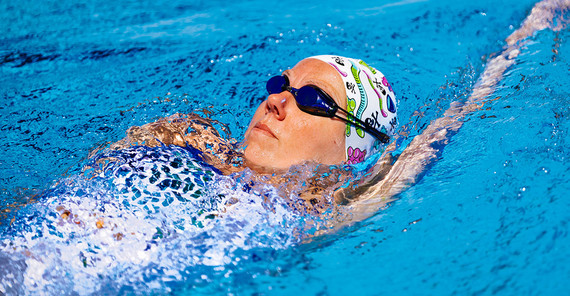In total, Schott has won 35 medals at major events: Success that doesn’t come out of nowhere. Nothing works without daily training: from half past eight to twelve o’clock in the mornings, followed by physiotherapy, and on some days a second round in the afternoon. On the weekends, there are often competitions or even more training. A burden? “No, I like swimming,” she says. “It’s more fun on some days than others, of course, but that’s just part of the deal.”
Competitive sports and family
The 35-year-old lives in Berlin but trains at the National Para-sports Center in Potsdam and competes for the Brandenburg Prevention and Rehabilitation Sports Club. Her coach, Maik Zeh, is also her partner, with whom she has two children. It’s not unusual for them to say goodbye at the breakfast table in the morning and see each other later at the gym. While he is still packing lunch, she is already in the pool, or vice versa. Competitive sports and family: It only works if everything fits. The competitive swimmer has “infected” her two sons. The older one already attends a sports school. It’s hard to imagine that the second won’t follow in his footsteps.
But Schott isn’t stopping at sports: She is studying biology and chemistry at the University of Potsdam to become a teacher. How does that work? “It doesn’t work at all,” she says. “Something always falls by the wayside.” And yet, she pulls it off. It also helps that the university sees itself as a partner university for elite sports and supports dual careers for athletes. “Otherwise I wouldn’t be able to study.” Particularly the expansion of digital teaching is a great advantage. “Most courses take place during my training. I wouldn’t be able to attend them.” But thanks to recorded lectures, digital work materials, online events and examination formats, she can integrate study into her training schedule. Many of her professors understand her special situation and work with her to find solutions beyond the standard curriculum. “I have received a lot of help at the University of Potsdam, which is great because otherwise I wouldn’t be able to manage it.” At the same time, there is still room for improvement, the para-swimmer says. “Sometimes people make things difficult and don’t want to make concessions. Or I encounter barriers on campus that make things not fully accessible.” Nevertheless, she is still determined to become a teacher – and is looking forward to teaching one day.
Swimming among the world's best
For now, the pool remains the place for special moments, like at the Olympic Games. “The atmosphere, the setting, and the many athletes from the other disciplines – that’s what makes the Games so special,” she says. Even if swimmers like her often cannot experience everything firsthand because there are competitions almost every day. At the Paralympic Games in Paris in summer 2024, she competed in five distances. Schott had a magnificent start to the summer: At the European Championships in Madeira (Portugal) in May, she won five medals: two gold, one silver, and two bronze medals. So, the expectations for Paris were accordingly high. But the para-swimmer faced challenges at the start: A persistent infection had made the final stage of her preparation difficult. In the end, she didn’t make the podium, but her best result was a 5th place in the 100 meter breaststroke. No reason for Verena Schott to throw in the towel. “Performances among the world’s best are often very tight. Things don’t always go as planned,” she says. At least she has once again shown that she can swim right at the front – reaching three finals in five starts – and that hurdles don’t throw her off track.
Schott loves challenges and competitions. But they must be fair. Not an easy task, especially in parasports. How do you compare the athletes and their performances? “The system is not yet fully developed and could be much better,” the swimmer says. There are too many different types of impairments that have to fit into a relatively small system of classifications. “Some also cheat. A suitable medical report and you compete in a more advantageous classification.” This must be prevented. “We don’t just want clean sports in terms of doping, we also want to compete fairly with each other.”
Verena Schott is studying biology and chemistry for the teaching profession at the University of Potsdam and is a competitive athlete.
This text (in german language) was published in the university magazine Portal - Zwei 2024 „Europa“ (PDF).

